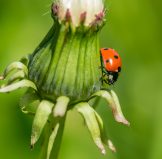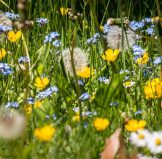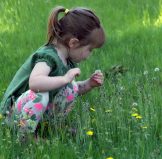 Give yourself a break by putting away your lawn mower for the month of May with the additional benefit of feeding our early bees!
Give yourself a break by putting away your lawn mower for the month of May with the additional benefit of feeding our early bees!
Lawns are generally a sterile environment for pollinators, but we can turn them into a temporary food source to give bees a leg up in the crucial spring season. By allowing plants typically identified as “weeds” (think dandelions, violets, clover) to flower they can provide food and fuel for our early pollinators that are emerging from hibernation. In turn, these bees go on to pollinate our fruit trees, shrubs, and wildflowers.
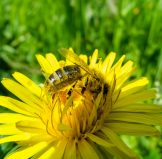 This calorie-rich buffet is helpful for our European originating honeybees and, even more importantly, for the nearly 950 species of Colorado native bees, many of which are solitary and nest underground and in hollow stems. As you may be aware these bees are facing catastrophic declines. The New York Times states that “In North America, nearly one in four native bee species is imperiled, according to the Center for Biological Diversity, partly because of habitat loss, pesticide use, climate change and urbanization.”
This calorie-rich buffet is helpful for our European originating honeybees and, even more importantly, for the nearly 950 species of Colorado native bees, many of which are solitary and nest underground and in hollow stems. As you may be aware these bees are facing catastrophic declines. The New York Times states that “In North America, nearly one in four native bee species is imperiled, according to the Center for Biological Diversity, partly because of habitat loss, pesticide use, climate change and urbanization.”
Originating in England, the No Mow May movement took hold in the United States when 435 Appleton, Wisconsin homes registered to participate in their local program two years ago. During this time Lawrence University biology scientists Dr. Israel Del Toro and Dr. Relena Ribbons found that these unmown home gardens had five times more bees and three times the bee species compared with mown parks. Armed with this information, they asked other communities to participate, and the movement has since spread to a several dozen U.S. cities, many across the upper Midwest.
Another benefit of not mowing your lawn is the reduction of emissions from gas-powered lawn equipment.
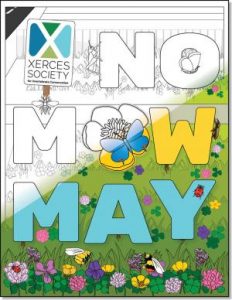
Aesthetics of a shaggy lawn can be a challenge for those residing in suburban environments, particularly in wet springs when grass can quickly grow long and lush. Knowing that this is a temporary, one month, state of being is helpful. To avoid misunderstandings, “talk to your neighbor; talk to your community; get the word out about what you’re doing and why you’re doing it, and generally you’ll find a lot of good allies,” says Del Toro.
Yard signs can be a helpful tool, so that others know you’re not being neglectful. Download your free sign from the Xerces Society!
It is recommended that for the initial mowing, you should raise the lawn mower blade height or use a string trimmer first. (Don’t forget to harvest a few edible, nutritious dandelion leaves and flowers for your salad beforehand!)
We encourage to you leave your lawn mower in the garage this month knowing that we are helping our pollinators with a strong starting meal for the growing season!

